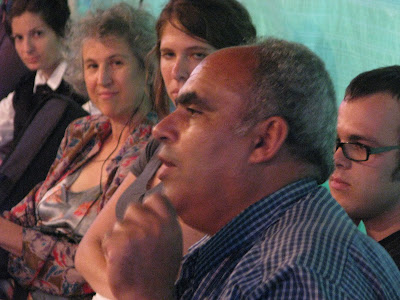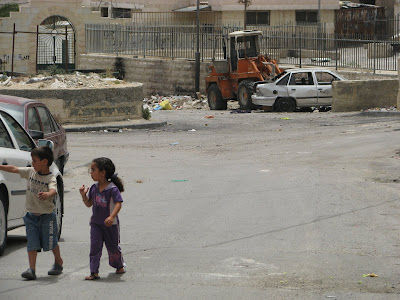 Tonight at 7:00 PM, Jews, Arabs and foreigners will gather in front of the Ministery of Defence in Tel-Aviv to protest the killing of activists in international waters.
Tonight at 7:00 PM, Jews, Arabs and foreigners will gather in front of the Ministery of Defence in Tel-Aviv to protest the killing of activists in international waters. Even if there were weapons on the boats, The IDF should have prepared for such scenario and made plans to avoid a bloodbath. When a group of people tries to break through a border (and this isn't even our border, remember? We no longer "occupy" Gaza) it is the police that usually arrests them. In this case Israel sent commando units, trained to be trigger happy.
The result is so painful and dangerous that the Israeli public and media are desperately seeking ways to avoid looking them in the eye: "It was an honest mistake", "they were terrorists who wanted to lynch our soldiers". The word "lynch" is everywhere in the Hebrew media. In the name of anyone ever hung from a tree in South Carolina due to his or her skin color, I'm outraged.
Though certainly outraged enough to go out and protest (hell, I'm outraged enough to give up my citizenship right here and now), I won't be at the demonstration tonight. Duty calls: I am sent as a journalist to review the grandest and what may prove to be the tackiest cultural event in this country's history: Verdi's Nabucco, produced at the foot of Massada.
Up until this morning I didn't pay much mind to the cheesy, nationalistic aspects of staging an opera about enslaved Jews at Massada. I was even interviewed on television and said there's no harm in taking opera to the desert and throwing a couple of fireworks around. Now, however, I feel distraught, sick to my stomach. I tried to escape the assignment and failed. I'm doomed to this four-act masterpiece.
Massada, the mythical stronghold, the place Roman soldiers beseiged and then broke into by force, thus completing their assault against the Judean liberation brigades. What an exciting place to be tonight! Siege of course is a contemporary concept. This morning the Israeli air force bombed and demolished what was left of Gaza's small airport already defunct for nearly a decade. No one will leave the strip in the foreseeable future. As for braking in by force... hell, we make good Romans, don't we? Had the legion of Titus possessed helicopters, the two actions would have been nearly identical.
And opera, O opera! I love it so, but is this really a good time for the conductor to raise his baton? The Jewish Midrash Describes God as showing anger at the Israelites after they crossed the Red Sea. The Egyptians were drowned by the waves and the Hebrews sang songs of praise. "My creations are destroyed at sea, and you are singing?" he asked.
Several creations of the good lord were destroyed at sea this morning, and the soloists of the Opera will sing nonetheless. The bad timing is none of their fault, the tragedy belongs to all of us.
What will they be singing? an opera about imprisonment and tyranny, written only seemingly about Jews and Babylonians, it in fact meant to protest Austria's reign in Lombardy and other Italian regions. I'll take it as that and concentrate on Verdi's courage and genius. In the year 2010, Nabucco is an opera about Palestinians. Let its music ring out and be another voice of protest.








































